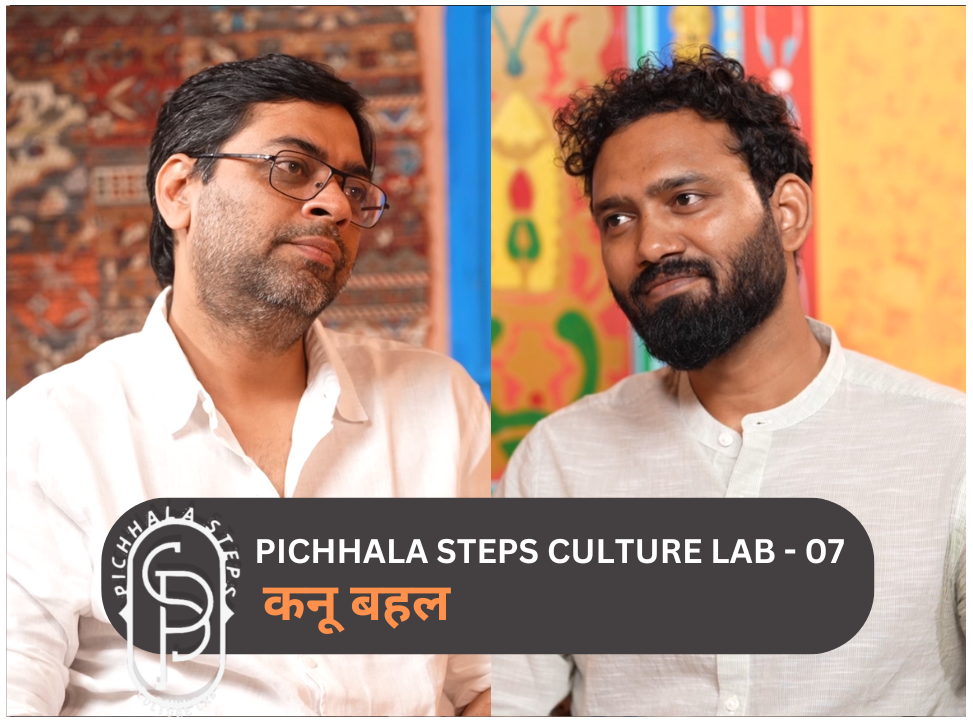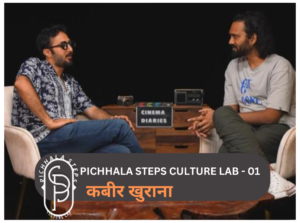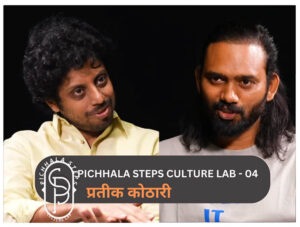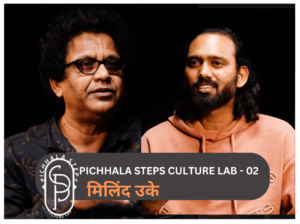Introduction: As I always say, films and stories are a very big part of our lives. Films and stories are those schools that teach us a lot without a teacher, without books. In such a situation, a responsible filmmaker must make such a film and take it to the streets of society where we never want to go.
Introduce us to those characters whom we never want to meet. And today, I have got a chance to document the cinema journey of such a great filmmaker so that we can make our lives a little better.
Moderator, Satish Narayan: Thank you very much, Kanu, for coming to our show.
Guest, Kanu Behl: Thank you, Satish, thank you for having me.
Satish: Kanu, why is it that, especially an Indian filmmaker, whose films he makes, whose stories he tells, the characters he introduces, those films do not reach them?
Kanu Behl: I think the main reason for this is that cinema is a little different from other art forms. There is a commercial element included in it. Cinema is not like sitting at home and writing a book or making a music piece or a painting. Cinema is an art form in which you need other people with you, at a minimum of 10, 15, 20, 50, depending on what kind of film you are making and what the scale is. So when it becomes collaborative and a little bigger, then obviously there is a commercial aspect to it. The effect of money is added to it.
So, these kinds of films never reached people. Maybe they do not reach people now. We are in an environment where it has become 10-15% more difficult. I won’t say that it has become more difficult now. I am sure if you go to the 70s, 80s and talk to Shyam Benegal, Govind Nihalani, Girish Kasarvalli or anyone, they will also say that it was that difficult. And it has always been difficult. That is because its commercial aspect always takes over. There are a lot of commercial considerations to get a film out and reach people. So, adding all that together, some people who are sitting in certain positions, they feel that they would like to see more of the same kind of film.
And the result of that is that what you are saying is what you are saying. So, I think the way our system is, the way our public discourse is on how much art is needed in your life, and what is the importance of art, this is a matter related to all those things. So, you will get the answer to this somewhere from here.
Satish: Yeah. I also think like this, but at the same time, as government also need to support independent films. Every filmmaker’s first film is very personal. It has a lot of personal sentiments and stories attached to it. Your first film Titliis a story of every city. In every city, there is a village, a family, where this happens. Either we ignore it or we do not want to go. We do not want to wander in that lane. How did you explore that story with Titli?
Kanu Behl: Let me give you a little preamble. What happened with *Titli* was that LSD ended. Actually, even before that, I had already written a full feature screenplay in film school.
I have never talked about this before. But again, my mentor Shyamul Karmakar, he used to do a lot of work outside of film school. He was an active filmmaker. He was our editing HOD, but he was an active filmmaker. He used to make documentaries, and he was writing a feature project at that time. He asked me, will you write with me? There was a feature script that I had already written while I was at film school. It had ended. It never got made. It was called Last Days of Ropa.
I had already written that. So, I already had that taste of writing a full feature film. And the reward for that, when you get those 100 pages, the feeling you get after seeing that, I already had that taste. And after writing LSD, I was even more passionate about it. So, almost after LSD, I told Dibakar that I wanted to write something for myself. So, I disappeared.
I wrote another film before Titli. That also never got made. And it was right that it didn’t get made. It was a little inspired. That was also a part of my journey. Because I think at that point, I didn’t care about what I was making and why I was making it. Sometimes, we get lost on the way. So, seeing Bombay around me, seeing all the work being done, I think I reached a point where I wanted to make a film. And I wrote an inspired film in 1-1.5 years. I even remember finishing that script and went to Dibakar. Dibakar read it and said, why are you writing this? Why are you making this? And I didn’t understand. I think if he had told me directly what is your connection with this, I would have understood it better. But he only told me this much. And I think he thought that he had said this. But I didn’t understand.
He said, why are you making this? I said, what do you mean? He said, there are 3 stories in this. It was an anthology. Yes, there were 3-4 stories. Anyway, there were 3-4 stories. He said, why don’t you make it on one of these? But I was stubborn. I said, no, I want to make this. I think he felt a little bad because he had more expectations than me. But he said, okay. Do one thing. Cast the film. And I am not sending you alone. There was a producer with him, Priya. Priya Shridhar. So, Priya and you work on this. Cast it. If it happens, we will make it. So, I tried to cast that film for 1-1.5 years. So, you tried to write and cast it? Yes. So, I tried to cast it for almost a year. I met a lot of actors. They used to say, I don’t have a main role in this. This and that. So, that happened. I understood a different facet of the city we live in.
But at the same time, when it was going on, there was a storm in my personal life. A lot was happening. And at that time, because of certain things, I got divorced. I got divorced. That was not going on. The film was not being made. Along with that, there was another storm. So, suddenly, everything crumbled. Everything broke. And I reached this position where I automatically started re-evaluating everything. And I started thinking about doing everything from the beginning. I started thinking about it. And I started asking myself, why did Dibakar say this? What was he saying? And then I understood that this film is about me. This film has nothing to do with me. I have nothing to do with it. So, why am I desperate? And why do I need to make a film? And actually, when there is so much major in your personal life, you are re-evaluating everything. So, in some ways, I was asking myself, why do I have to make a film? Why do I have to make this? So, when I went there, I understood that this is desperation. This is not a film, this is desperation. And if I have to make something, something genuinely… So, I thought, why did you start? Why did you start? Earlier, I thought that I had to make a film because you had a conversation, and now you are here. So, I was asking myself all this. Now, I am in desperation to become a filmmaker. I didn’t want to become a filmmaker. I wanted to talk. So, I asked myself, what do I have to talk about? So, I said, now I will write something which has a direct connection with my life. Whether it becomes a film or not, I don’t care. I don’t think about it.
I think this is the responsibility and the sense of understanding because of which your first film, which you co-wrote, LSD 1, part 1, was a little earlier than time. It was MMS, it had its songs, its music. It was a new story.
So, I had to cancel the contract. Best of luck. Make the locals happy. Let’s do this together. How did you connect with Dibakar and with him after SRFTI? I was very lucky because at that time Dibakar was shooting Oye Lucky! Lucky Oye! My first film with him at that time he was looking for an editor for his film.
I think he went to FTII where he met Shyamulda who was my mentor and he was talking to Shyamulda about editing his film. So, in that regard he asked me if he could see my work. So, Shyamulda, at that time I was shooting a documentary in Delhi.
Satish: Actor Prepares?
Kanu Behl: No, this is another film. Actor Prepareswas my student project. It was shot in Kolkata. After that, I was shooting a professional documentary for a Japanese channel called NHK. Actually, till then NHK didn’t commission me. I used to feel that I was in film school and I wanted to start something of my own. I had a strange idea that why am I calling myself a filmmaker if I am not making a film. At that
time, I didn’t even understand that I can call myself a filmmaker without making a film. Now, I tell everyone that you should call yourself what you are. Because until you become what you want to become, you won’t reach it. So, this is a small philosophy. So, at that time, I thought that I am a filmmaker. I went to the Japanese channel and said that I will make this film. They agreed. So, I was shooting that film at that time. So, I was talking to Shyamulda about this. Shyamulda told me that I have a student named Kanu who was editing this film. So, he showed Dibakar Actor Prepares.
After seeing that film, he liked my editing a lot. He said that the editing has a very good rhythm. So, Shyamulda said that when Kanu comes to Kolkata, you can meet him. So, when I came back from Delhi after shooting, I met Dibakar for the first time in Shyamulda’s room. And we talked for a long time. I remember that we talked for 4-5 hours. We had a lot of things in common. He said that he wanted to get his next film edited.
I thought that if I didn’t finish the film with the Japanese channel, they will fire me. So, I asked him to wait for a month. He said that he didn’t have time. We were both very disappointed because I felt that I will get a chance to edit my first feature. So, he left. But after a month, he called me again. He said that he was looking for an editor for a month. He didn’t get anyone. He said that he will wait for me.
So, I told the Japanese channel to fire me. I said that I am leaving. I left the Japanese channel and went to him. So, in 3-4 months, I was editing *Oye Lucky! Lucky Oye! with him. And when I was working with him, we had a great time working together. And then he told me that he was writing his next film. He asked me to write it with him. I was very surprised. I was wondering why he was asking me to write. He said that I am a writer. So, I asked him to write with me. So, we started writing. And this is the story of the connection.
Satish: It seems like Titli is a film inspired by your own experiences and surroundings. How did you balance personal experiences and fictional elements while writing it?
Kanu Behl: Yes, Titli is deeply rooted in my personal experiences. The balance came naturally as I aimed to tell a story that was genuine and raw. I used my personal life as the foundation and built fictional elements around it to create a narrative that resonates with a broader audience. It’s about finding that fine line where personal truth and creative storytelling meet.
Satish: Titli portrays the harsh realities of life in a very raw and unfiltered manner. How did you ensure that the film remained authentic to its core while still being engaging for the audience?
Kanu Behl: Authenticity was crucial for Titli. We spent a lot of time researching and understanding the world we were portraying. The casting was also vital – we chose actors who could bring a naturalistic performance to the screen. The goal was to keep the narrative as real as possible, and I believe that honesty in storytelling naturally engages the audience. We didn’t shy away from the harsh truths, which made the film more impactful.
Satish: Your films often depict the darker aspects of society. What draws you to these themes, and how do you hope your audience will respond to them?
Kanu Behl:I’m drawn to the darker aspects of society because they often reveal the most about human nature and societal structures. These themes allow for a deeper exploration of the human condition. I hope my audience will not just see the darkness but also understand the underlying issues and reflect on them. It’s about sparking a conversation and encouraging introspection.
Satish: How do you see the future of independent films in India, especially those that tackle unconventional or challenging subjects?
Kanu Behl: The future of independent films in India is promising yet challenging. There is a growing audience for unconventional and challenging subjects, thanks to the increasing reach of digital platforms. However, the traditional commercial constraints still pose significant hurdles. I believe that as long as filmmakers continue to push boundaries and tell honest stories, independent cinema will thrive. It’s essential for filmmakers to find innovative ways to reach their audience and for the audience to support such films.




